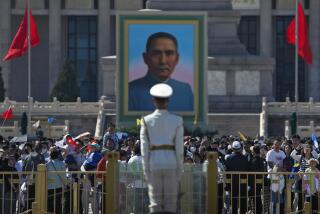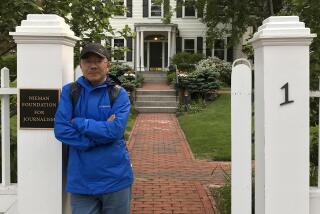TURMOIL IN CHINA: Protests For Democracy : Dissident Fang Foresees Crackdown on Chinese Intellectuals
- Share via
BEIJING — China’s most prominent dissident, astrophysicist Fang Lizhi, said Friday that he believes conservatives soon will crack down on liberal intellectuals and possibly arrest him.
But Fang said he believes six weeks of pro-democracy protests will benefit China. “For the first time . . . students, intellectuals and ordinary people know they have the right to criticize the government,” the scientist said in an interview.
Before the demonstrations for a freer society began in mid-April, only a few Chinese dared criticize the Communist government publicly. Fang led the way with scathing remarks about Marxism and calls for democratic change.
His outspoken criticism resulted in his purge from the Communist Party in early 1987 during a campaign against “bourgeois liberalization,” or support for Western liberal ideals.
He upset Chinese leaders so much that they prevented him from attending a banquet given by President Bush during his trip to Beijing in February.
Chinese conservatives, led by senior leader Deng Xiaoping, again have called for a fight against “bourgeois liberalization” in their power struggle with moderates, which broke out as a result of the protests.
“Deng and some other leaders always want to crack down on liberal intellectuals,” Fang said. He said he did not know of any arrests yet but estimated there is a 50% chance that he will be jailed.
Fang said he has kept a low profile to prevent the government from accusing him of being behind the protests, which led to the imposition of martial law in Beijing.
Last month, government spokesman Yuan Mu questioned Fang’s patriotism and said, “The role Mr. Fang wants to play in the current disturbances will be decided by his words and deeds.”
An effigy of Fang marked with the word “traitor” was torched at a government rally Wednesday just outside Beijing.
“For me personally, it’s a joke,” Fang said. The burning of the effigy failed to stir up the rally, which quietly ended minutes later.
But the professor added that the tactics were reminiscent of the Red Guards who terrorized the country during much of the 1966-76 Cultural Revolution.
“If society keeps quiet, orderly and nonviolent . . . I think I’m safe,” Fang said. “If the government organizes some chaos . . . like the Red Guards, then I’m in danger.”
Fang believes that although conservative leaders want a strong crackdown, there is little support for such a move, even among rank-and-file party members.
Fang believes China will benefit from the uprising, despite the apparent ascendancy of hard-liners in the power struggle. He drew an analogy with Poland, where martial law could not quash the Solidarity trade union movement.
“The people don’t believe in Deng. He already lost his face.”
More to Read
Sign up for Essential California
The most important California stories and recommendations in your inbox every morning.
You may occasionally receive promotional content from the Los Angeles Times.













